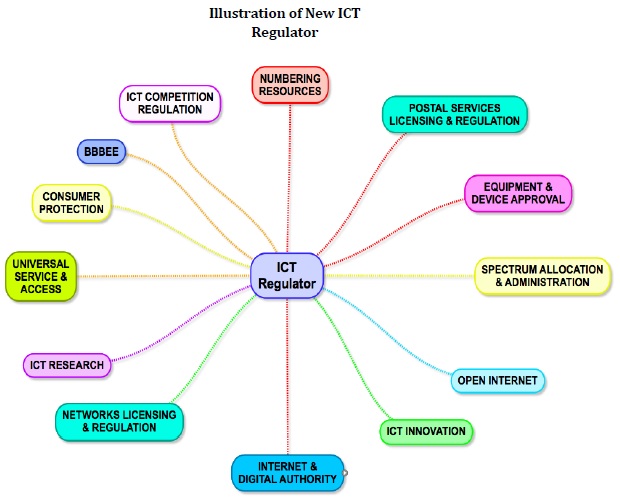Discussions
Is any stakeholder happy with the ICT Policy White Paper?
Tarik Oguz, tralac Research Advisor – Information and Communication Technologies, comments on the debate surrounding the recently-published ICT Policy White Paper for South Africa
On October 3, 2016, the South African Government has released the much anticipated “National Integrated ICT Policy White Paper” (hereafter referred to as The White Paper).
It is a rather comprehensive work prepared collaboratively by several government departments and certainly gives the impression that the Government tried to cover many recent developments in a single document that is intended to lead towards policy developments and regulations.
The White Paper focuses on the Government’s ambitious plans about Sustainable Development Goals published in National Development Plan 2030 (NDP). It makes a bold attempt to address the issues related to all aspects of the Information and Communication Technologies. What the term ICT (Information and Communications Technology) covers in The White Paper can be summarised as:
- computing and information technology;
- telecommunications technology (including fixed and wireless telephony and data communications);
- audio and audio-visual content (including broadcasting);
- the Internet (including the services delivered); and
- postal services
When it comes to services that are delivered to consumers over these platforms (and technologies) there is an increasing convergence taking place and the lines of separation between the sectors are blurred.
Mobile Network Operators (MNOs) offer financial services (i.e. mobile money; mPesa) to small traders including cross-border traders who historically did not have bank accounts; and the traditional banks offer services via mobile telephones to their business and private customers to check on their accounts and carry on transactions like balance inquiries, electronic funds transfers, invoice payments for utilities and, of course, online shopping.
Our telephone service plans at home can be combined with internet access services, and mobile phone service plans for all family members in a single account. Furthermore, the majority of us could add content delivery services (i.e. downloading music and movies or watching live music or sports events around the world) into this single account.
From the Government’s perspective all of these converged “commercial” services should be delivered to all private citizens as well as private and public institutions in a transparent and competitive market governed by a set of rules that is applied equitably to all stakeholders. This includes adequate spectrum allocation and licensing for all broadcasting and broadcasting-like content delivery organisations. Government is responsible for ensuring the integrity, transparency and security of all services.
One significant aspect of The White Paper is the announcement of the new “ICT Regulator”; an autonomous body which will assume the existing responsibilities of USAASA (the Universal Service and Access Agency of South Africa); the responsibilities of .za DNA (.za Domain Name Authority); and some responsibilities of ICASA (Independent Communications Authority of South Africa).
The following diagram illustrates the complex structure of interconnected responsibilities and the decision making authority of the “ICT Regulator”. It will be working with multiple stake holders both within the Government and the industry; and it will be accountable to the Minister of Telecommunications and Postal Services as well as to the Parliament.
The White Paper explains the justification for the establishment of this entity as the new holistic approach for regulation to address previous criticisms of the fragmented structure and unclear lines of responsibilities and accountabilities.

Source: National Integrated ICT Policy White Paper (p. 165)
Another important recommendation made in The White Paper is the introduction of the new “Wireless Open Access Network (OAN)”. The White Paper makes this recommendation based on the open access principles of the Electronics Communications Act (ECA) of 2005. All network providers will be required to offer network services in line with the principles of open transparent access and non-discrimination basis. OAN, when licensed and implemented, only provides wholesale services and cannot provide retail services. However, network operators are able to develop retail services on this network and offer to the public once they apply and acquire the requisite licenses. It appears that existing infrastructure that is already built by private investment may be considered as part of the OAN and this will cause some resentment among the industry players who have made substantial infrastructure investments to date.
The White Paper also covers the strategic direction for future of licensing and spectrum allocation of broadcast services as well as the traditional postal services.
The White Paper has been widely debated in the media by industry players such as social & technical commentators, service providers, academics and research organisations working in the ICT area.
The majority of the comments are cautiously critical of the Government for ignoring its own guidelines on transparency during the final phase of the preparation of The White Paper and failure to consult stakeholders prior to publishing the final version of the document. Wireless OAN was also a concern for industry players, with existing MNOs in particular emphasizing the perceived uncompetitive nature of this wholesale network.
We believe that the underlying intentions of The White Paper are very positive; however, the Government needs to continue with the public consultation and debate in order to achieve a national consensus in implementing the future infrastructure for our digitally connected inclusive society.
Sources:
Dept of Telecommunications and Postal Services https://www.dtps.gov.za; Media reports
Interested readers are able to read the entire document by clicking here.

